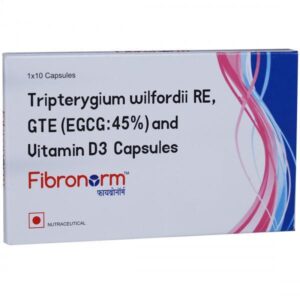VITAMIN D3 (CHOLECALCIFEROL) + GREEN TEA EXTRACT
Vitamin D3 (cholecalciferol): Vitamin D3, also known as cholecalciferol, is a prohormone that is naturally produced in the skin when exposed to sunlight. It is also available as a dietary supplement and is prescribed for various medical conditions.
The primary function of Vitamin D3 is to regulate the absorption of calcium and phosphorus in the body, which is essential for maintaining healthy bones and teeth. It plays a vital role in the formation, growth, and repair of bone tissues. Additionally, Vitamin D3 also has immunomodulatory and anti-inflammatory effects.
Vitamin D3 is commonly used to treat or prevent conditions such as rickets (softening and weakening of bones in children), osteomalacia (soft and weak bones in adults), and osteoporosis (brittle bones). It is also prescribed to individuals with deficiency or insufficiency of Vitamin D, which can occur due to inadequate sunlight exposure, dietary deficiency, malabsorption, or certain medical conditions.
The dosage of Vitamin D3 varies depending on the individual’s age, underlying condition, and blood levels of Vitamin D. The recommended daily intake for adults is typically between 600-800 international units (IU). However, higher doses may be prescribed for individuals with deficiency or specific medical conditions.
Side effects of Vitamin D3 are generally rare when taken at recommended doses. However, excessive intake of Vitamin D3 can lead to toxicity, known as hypervitaminosis D. Symptoms of toxicity may include nausea, vomiting, poor appetite, constipation, weakness, and confusion. Very high levels of Vitamin D3 can also cause elevated calcium levels in the blood, leading to kidney stones and calcification of soft tissues.
It is important to note that Vitamin D3 supplements should be taken under the guidance of a healthcare professional, as they can interact with certain medications, such as steroids, antacids, and cholesterol-lowering drugs. Additionally, individuals with certain medical conditions, such as hypercalcemia or kidney disease, may require careful monitoring when taking Vitamin D3 supplements.
Green Tea Extract: Green Tea Extract is derived from the leaves of the Camellia sinensis plant and is commonly used as a dietary supplement. It contains various bioactive compounds, including polyphenols, catechins, and flavonoids, which are believed to have numerous health benefits.
The primary use of Green Tea Extract is as an antioxidant to help protect cells from damage caused by free radicals. It is also known to boost metabolism, improve cognitive function, and have anti-inflammatory effects. Some research suggests that it may help prevent certain types of cancer, lower cholesterol levels, and promote weight loss.
The exact mechanism of action of Green Tea Extract is not fully understood. However, it is believed that the polyphenols in the extract help to neutralize free radicals, reduce oxidative stress, and prevent cell damage. Additionally, the catechins present have been shown to have anti-inflammatory and anti-cancer properties.
The recommended dose of Green Tea Extract can vary depending on the specific product and its concentration. Typically, a daily dose of 250-500 mg is considered safe and effective. However, it is important to follow the instructions provided on the product packaging or consult a healthcare professional for personalized dosage recommendations.
In terms of side effects, Green Tea Extract is generally well-tolerated when consumed in moderate amounts. However, some individuals may experience mild side effects such as stomach upset, headache, or dizziness. It is worth noting that Green Tea Extract contains caffeine, so excessive consumption can lead to caffeine-related side effects such as increased heart rate, sleep disturbances, or anxiety.
People with certain medical conditions, such as liver or kidney disease, gastrointestinal disorders, or those who are pregnant or breastfeeding, should exercise caution when using Green Tea Extract and consult with their healthcare provider before starting supplementation. Additionally, it is important to be aware that Green Tea Extract may interact with certain medications, including blood thinners, anticoagulants, and medications for high blood pressure.
Overall, while Green Tea Extract is generally considered safe and beneficial, it is essential to use it responsibly, adhere to recommended dosage guidelines, and seek medical advice if you have any concerns or pre-existing conditions.

